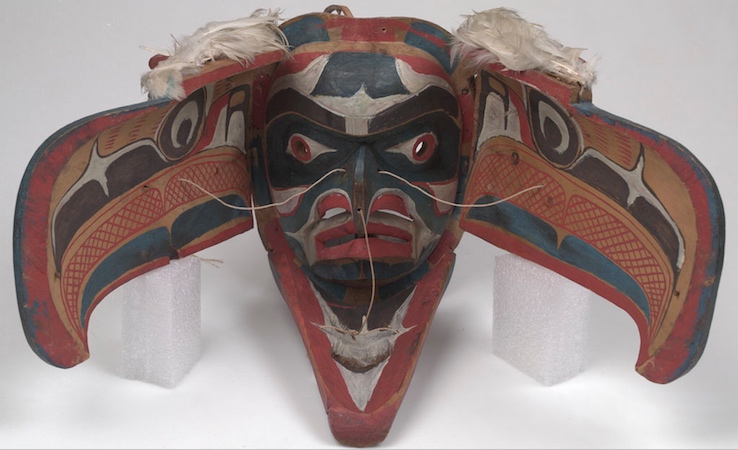Identify the designs included on the bandolier bag?
What are abstract and symmetrical designs?
Which two animals with cultural significance to the Kwakwaka’wakw people are depicted on the Transformational mask?
What are the Thunderbird and Raven?
In what region were the bandolier bags used?
What is the Woodlands region (Canada and United States)?
What is the function of the All T'oqapu tunic?
What is identifying the king to identify him and keeping him warm?
The bold designs of the bandolier bag were meant to play with?
What are multiple kinds of dualities?
Bandolier bags were dynamic in their design. The beaded motifs are both geometric and organic, one of many dualities suggested in their balance of positive and negative space. Made by women and worn by men, the bags would have produced sound and reflected light as they moved with the wearer.
Bandolier Bag: What material was used before the Lenape acquired silk ribbons?
What is paint?
Describe how the technique/materials of the transformational mask changed with colonization?
What is a change in the pigment/color process?
Prior masks used natural (plant & mineral) based pigments, but post-contact brighter, more durable synthetic pigments were used.
Identify the original function of the bandolier bag used by the Europeans?
What is used to carry ammunition?
#164 Transformational Mask utilizes this Pacific Northwest style characterized by the usage of black, red, and blue-green colors, oval-shaped (Ovoid) motifs, curvilinear shapes, and wood carving with red cedar. 
What is Formline Style?
What is the significance of a single T'oqapu?
What is a square design that represents your ethnicity, occupation, clan, or area?
One of the ways bandolier bags were a part of international trade was?
What is imported cloth from England and India?
In the Lenape culture, when were the bags used by men?
What are ceremonies?
A small square design on a tunic found around stomach or shoulders on upper-class tunics
What is a T'oqapu?
What do the abstract designs on the strap of the bandolier bag represent?
What are the cosmos - 4 cardinal points?
The function of the numayan of the Kwakwaka’wakw tribe is?
- Responsible for safeguarding their crest symbols
- Conveying specific rights (Access to natural materials or resources, salmon fishing areas, sacred names and dances)
- Were ranked and only 1 person could fill their given spot at each moment (Each rank had its own privileges/rights)
What 3 functions did the transformational mask serve?
What are conveying social position (only those with a certain status could wear them), portraying a family’s genealogy by displaying (family) crest symbols (inherited or gifted), and allowing ancestral entities to temporarily embody dancers wearing these masks and ceremonial costuming?
Style of the All T'oqapu Tunic?
What is a woven rectangle folded to be a square, with a slit woven into the middle for the neck, decorated with small red woven squares?
For Transformational Masks: Identify the materials and/or symbolism in the artwork that offer humans access to power. (College Board, 2015)
The materials used to create the mask in the image set include cedar, wood paint, fiber, and string.
Cedar, a readily available material in the Pacific Northwest, is prized for its density, strength, and longevity. Cedar is considered a sacred material — particularly red cedar as its color symbolism links it to the color of salmon, human blood, the sun, and fire.
As with many Kwakwaka’wakw works of art, both halves of the design and the support are symmetrical in composition. The carvings on the inner and outer portions of the mask often represent symbolic animals and human faces, although the representation of two animals in the same mask is not uncommon.
Northwest Coast art typically utilized such intricate designs that combined a myriad of animal, spirit being, and human elements to create composite beings, suggestive of transformation. The transformation mask in the image set features an external mask that is carved and painted to resemble an eagle or perhaps a crow. The wearer pulls on strings to open the mask bilaterally to reveal an interior mask with a human face.
Describe the technique/process and materials used to create the All-T’oqapu Tunic.
Acllacunas, highly skilled female weavers who used back strap looms to weave the best cloth called qompi, used cotton as the warp thread, and thread from animal fibers as the weft thread. They wove the tunics using a backstrap loom.
For Transformational Masks: describe both the type of power those materials and/or symbolism are intended to activate and the performance that activates that power (College Board, 2015)
Transformation masks appeared as part of initiation rituals during the winter ceremonial period and also at the ceremonial occasions of the potlatch.
Masks are personal to the wearer and the wearer’s family because the figures depicted on them represent the dancer’s ancestral and/or spiritual counterparts.
During the ceremonial dances, the wearer of a transformation mask performed it by opening and closing the exterior mask to reveal the inner mask. This process of revealing enacted a transition between the world of spirits and ancestors and the human world. The masks simultaneously enable and represent transition between worlds. Through manipulation of the mask and in performance, the wearer communes with spirits. The wearer gains spiritual power through this act of communion and transformation. Only those men who are initiated are allowed to perform in the ceremony and experience the transition. The mask can be thought of as marking the wearer’s status in the community by asserting his relationship with ancestors and the spirit world.